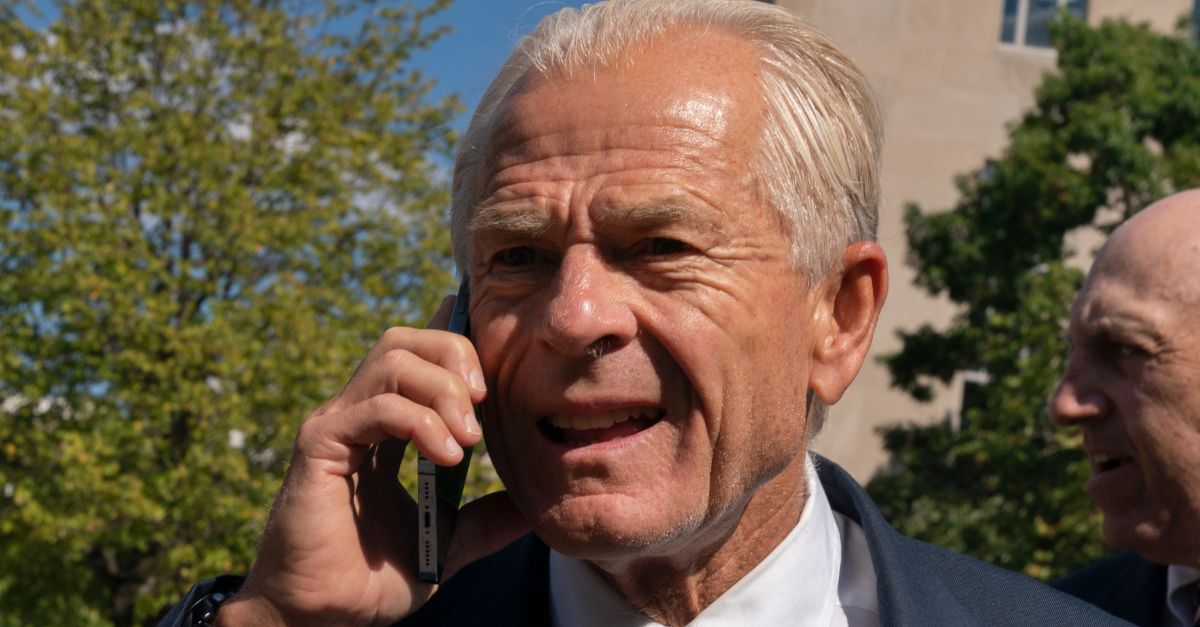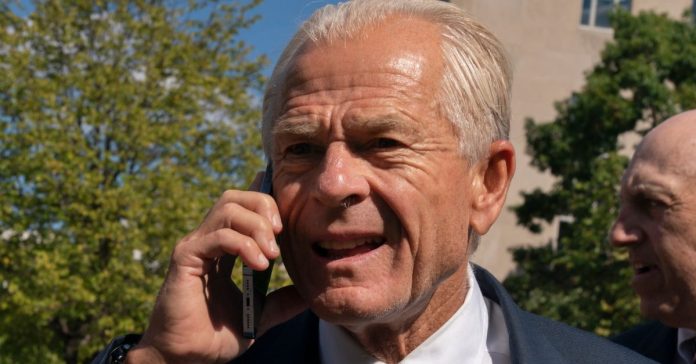
Former White House trade adviser Peter Navarro leaves federal court in Washington, following a status conference on contempt of Congress charges for his refusal to comply with a subpoena issued by the Select Committee to Investigate the January 6th attack on the United States Capitol, Wednesday, Aug. 31, 2022. (AP Photo/Manuel Balce Ceneta)
Peter Navarro, convicted on two counts of contempt of Congress for his refusal to comply with a subpoena for the House committee investigating the Jan. 6 attack on the U.S. Capitol, is headed to prison effective March 19 — and if he cannot succeed at staying his fate on appeal, he has vowed to take his fight to the U.S. Supreme Court, according to court records.
The proclamation was made in a 14-page appellate reply brief supporting his previous emergency motion to stay his four-month sentence.
“Dr. Navarro has now been ordered to report to the custody of the Bureau of Prisons, FCI Miami, on or before 2:00PM EDT on March 19, 2024,” Navarro’s attorney Stanley Woodward wrote. “Accordingly, Dr. Navarro respectfully reiterates his request for an administratively stay so as to permit the Court to resolve the instant motion. Should this Court deny Dr. Navarro’s motion, he respectfully requests an administrative stay so as to permit the Supreme Court review of this Court’s denial.”
As Law&Crime previously reported, the former White House trade adviser to Donald Trump asked the U.S. Court of Appeals for the District of Columbia to pause enforcement of his sentence last month.
He argues, in effect, that “for the first time in history, a senior presidential adviser has been held in contempt of congress after asserting executive privilege” and that “it has been the position of the Department of Justice for more than a half-century that senior presidential advisers may not be subject to congressional subpoena.”
He has been rejected on these grounds before by U.S. District Judge Amit Mehta; the judge found no proof that Trump had invoked executive privilege over his testimony or records when the House Select Committee to Investigate the Jan. 6 Attack on the U.S. Capitol first subpoenaed him in early 2022.
Mehta would later deny Navarro’s request for a new trial as well after the 74-year-old self-proclaimed orchestrator of the “Green Bay Sweep” was found guilty by a jury in Washington, D.C.
Navarro unsuccessfully argued jurors had been improperly influenced.
Today, however, Navarro still rejects the prevailing argument at trial that he had multiple chances to establish an executive privilege defense but routinely failed to do so.
“In so arguing, the government appears to conflate the assertion of executive privilege with the district court’s requirement that President Trump ‘properly’ invoke executive privilege, the requirements of which the district court decided for the first time,” Woodward wrote.
The lawyer continued:
Put differently, despite the district court finding that Dr. Navarro thought he invoked [executive privilege] and that likely “[no]body would really dispute that Dr. Navarro thought he was supposed to invoke [executive privilege]”, it nevertheless concluded President Trump’s invocation of executive privilege as to the Select Committee subpoena to Dr. Navarro was not “proper,” pursuant to its resolution of an “open question” concerning the legal standard for such a “proper” invocation.
Thus, the district court’s decision on the elements of a “proper” invocation of executive privilege was not only an open question, but itself a substantial question.
Whether a president must “personally invoke” a privilege is what Navarro argues is unclear and therefore, he should be released pending his appeal.
With flourish, Woodward argued:
“To that end, the government blithely dismisses Dr. Navarro’s argument that requiring a formal invocation by a former president risks vitiating the privilege entirely insofar as to hold otherwise would preclude a former president unexpectedly suffering from disability or death to assert the privilege and enable the recalcitrant or disgruntled to affirmatively waive the privilege unbeknownst to the president. The government does not reconcile this reality as against the elements of a “proper” invocation of privilege it seeks this Court to affirm because it can not.
Prosecutors who have been opposed to the stay ignore the only comparable case — Steve Bannon’s contempt of congress conviction — according to the former trade adviser. Bannon was also in cahoots with Navarro in the Green Bay Sweep plan.
Like Navarro, Bannon was sentenced to four months and in that case, Woodward notes, the judge found a “substantial question” was raised about whether his appeal would likely result in a new trial being called for or a reversal of the verdict.
Have a tip we should know? [email protected]

